The Intel Core i9-9990XE Review: All 14 Cores at 5.0 GHz
by Dr. Ian Cutress on October 28, 2019 10:00 AM ESTCPU Performance: Web and Legacy Tests
While more the focus of low-end and small form factor systems, web-based benchmarks are notoriously difficult to standardize. Modern web browsers are frequently updated, with no recourse to disable those updates, and as such there is difficulty in keeping a common platform. The fast paced nature of browser development means that version numbers (and performance) can change from week to week. Despite this, web tests are often a good measure of user experience: a lot of what most office work is today revolves around web applications, particularly email and office apps, but also interfaces and development environments. Our web tests include some of the industry standard tests, as well as a few popular but older tests.
We have also included our legacy benchmarks in this section, representing a stack of older code for popular benchmarks.
All of our benchmark results can also be found in our benchmark engine, Bench.
WebXPRT 3: Modern Real-World Web Tasks, including AI
The company behind the XPRT test suites, Principled Technologies, has recently released the latest web-test, and rather than attach a year to the name have just called it ‘3’. This latest test (as we started the suite) has built upon and developed the ethos of previous tests: user interaction, office compute, graph generation, list sorting, HTML5, image manipulation, and even goes as far as some AI testing.
For our benchmark, we run the standard test which goes through the benchmark list seven times and provides a final result. We run this standard test four times, and take an average.
Users can access the WebXPRT test at http://principledtechnologies.com/benchmarkxprt/webxprt/
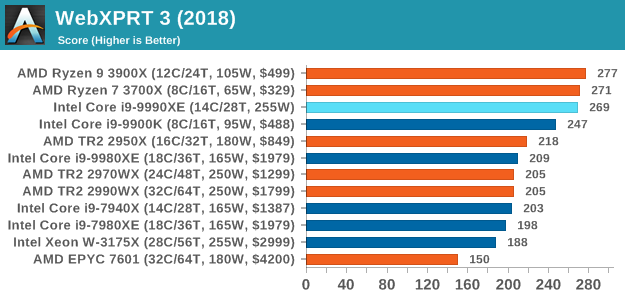
WebXPRT 2015: HTML5 and Javascript Web UX Testing
The older version of WebXPRT is the 2015 edition, which focuses on a slightly different set of web technologies and frameworks that are in use today. This is still a relevant test, especially for users interacting with not-the-latest web applications in the market, of which there are a lot. Web framework development is often very quick but with high turnover, meaning that frameworks are quickly developed, built-upon, used, and then developers move on to the next, and adjusting an application to a new framework is a difficult arduous task, especially with rapid development cycles. This leaves a lot of applications as ‘fixed-in-time’, and relevant to user experience for many years.
Similar to WebXPRT3, the main benchmark is a sectional run repeated seven times, with a final score. We repeat the whole thing four times, and average those final scores.
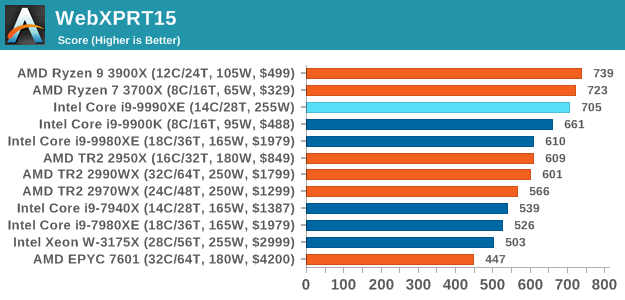
Speedometer 2: JavaScript Frameworks
Our newest web test is Speedometer 2, which is a accrued test over a series of javascript frameworks to do three simple things: built a list, enable each item in the list, and remove the list. All the frameworks implement the same visual cues, but obviously apply them from different coding angles.
Our test goes through the list of frameworks, and produces a final score indicative of ‘rpm’, one of the benchmarks internal metrics. We report this final score.
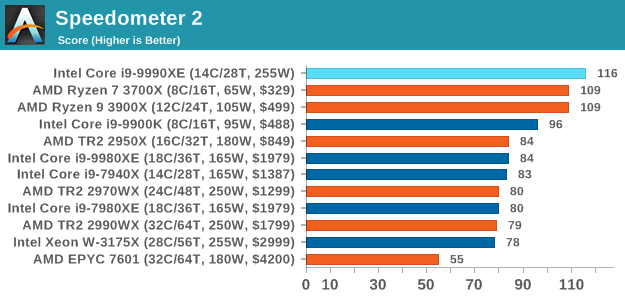
Google Octane 2.0: Core Web Compute
A popular web test for several years, but now no longer being updated, is Octane, developed by Google. Version 2.0 of the test performs the best part of two-dozen compute related tasks, such as regular expressions, cryptography, ray tracing, emulation, and Navier-Stokes physics calculations.
The test gives each sub-test a score and produces a geometric mean of the set as a final result. We run the full benchmark four times, and average the final results.
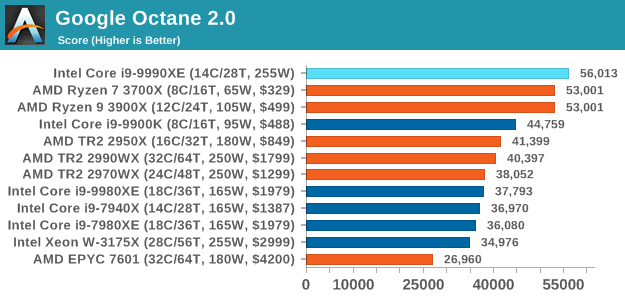
Mozilla Kraken 1.1: Core Web Compute
Even older than Octane is Kraken, this time developed by Mozilla. This is an older test that does similar computational mechanics, such as audio processing or image filtering. Kraken seems to produce a highly variable result depending on the browser version, as it is a test that is keenly optimized for.
The main benchmark runs through each of the sub-tests ten times and produces an average time to completion for each loop, given in milliseconds. We run the full benchmark four times and take an average of the time taken.
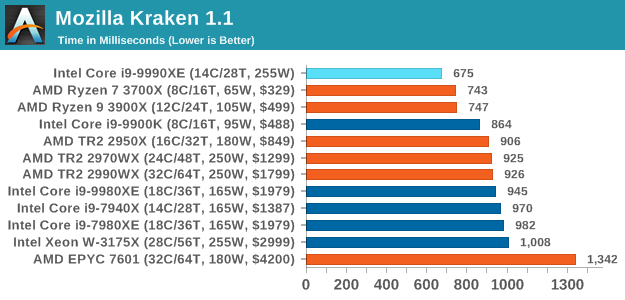
3DPM v1: Naïve Code Variant of 3DPM v2.1
The first legacy test in the suite is the first version of our 3DPM benchmark. This is the ultimate naïve version of the code, as if it was written by scientist with no knowledge of how computer hardware, compilers, or optimization works (which in fact, it was at the start). This represents a large body of scientific simulation out in the wild, where getting the answer is more important than it being fast (getting a result in 4 days is acceptable if it’s correct, rather than sending someone away for a year to learn to code and getting the result in 5 minutes).
In this version, the only real optimization was in the compiler flags (-O2, -fp:fast), compiling it in release mode, and enabling OpenMP in the main compute loops. The loops were not configured for function size, and one of the key slowdowns is false sharing in the cache. It also has long dependency chains based on the random number generation, which leads to relatively poor performance on specific compute microarchitectures.
3DPM v1 can be downloaded with our 3DPM v2 code here: 3DPMv2.1.rar (13.0 MB)
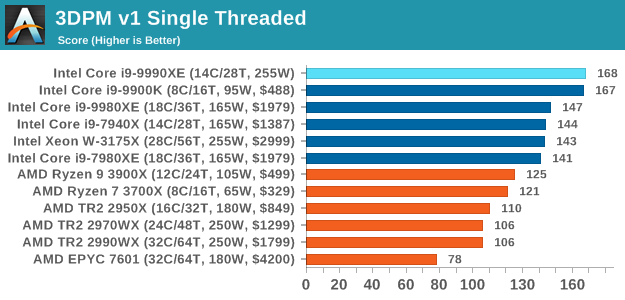
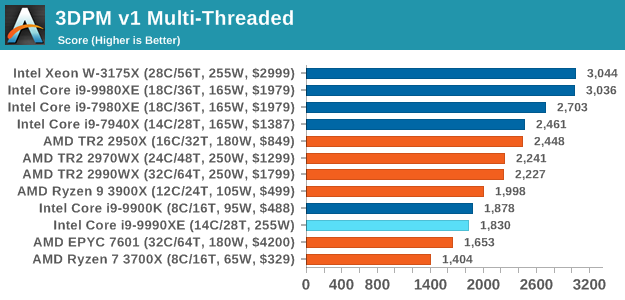
x264 HD 3.0: Older Transcode Test
This transcoding test is super old, and was used by Anand back in the day of Pentium 4 and Athlon II processors. Here a standardized 720p video is transcoded with a two-pass conversion, with the benchmark showing the frames-per-second of each pass. This benchmark is single-threaded, and between some micro-architectures we seem to actually hit an instructions-per-clock wall.
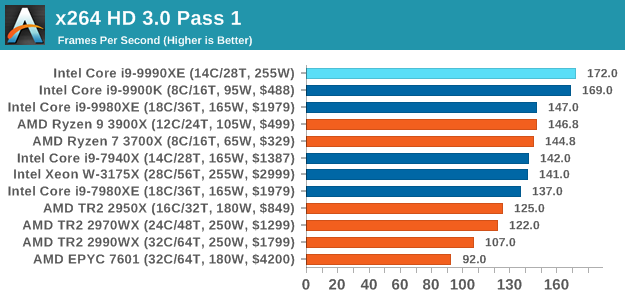
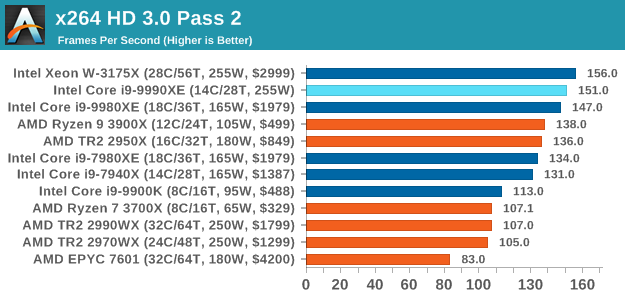










145 Comments
View All Comments
AshlayW - Monday, October 28, 2019 - link
Agreed. This product is a pathetic attempt to push their slight advantage in single-core, and justify the obscene pricing too. It's disgusting, really, tech press seem to lap up these things without understanding that this product is, well, pointless.Intel made like 5 of them. So, AMD could bin a 3950X so damn effectively, you can have 4.7 on all 16-cores, because trust me with that level of binning; it's possible. But they won't, because they actually have people buying thier silicon for datacentres.
Anyway, the ST performance isn't even that much higher. Nothing worth the obscene price. I'll wait for the 3950X, and hope AT will sing its praises as it will likely demolish Intel's entire HEDT at a lower price and half the power use - it's only fair.
xrror - Monday, October 28, 2019 - link
Guys, seriously...I'm an AMD person myself, but give Intel some credit - I doubt (sadly) that AMD could even release a Ryzen 5Ghz base clock part right now. Granted they might be able to bin out a 4.7 one but....
2nd, everyone going on and on about how expensive the 9990XE. Like it's under $3000? That's stupid cheap! Historically these HPC chips are like 1 or 2 cores enabled out of 12 and you pay over 5 or 10grand for them. Look up the old socket 1366 HPC chips like Xeon X5698 some time!
http://www.cpushack.com/2018/07/03/cpu-of-the-day-...
Korguz - Monday, October 28, 2019 - link
" Like it's under $3000? That's stupid cheap! " maybe in your world.. but for the rest of us, that is stupid expensive.xrror - Monday, October 28, 2019 - link
It is stupid cheap for a halo professional performance part from Intel. But even a cheap HPC - $3000 proc - it is more money than I could ever justify personally spending for what would essentially be a glorified gaming rig.Which means, we're not the target market. Even in your world.
Retycint - Monday, October 28, 2019 - link
The whole point of this chip is that it throws price-to-perf out of the window for highest possible ST perf sustainable on all-cores. You know, like what the article describes?But sure, AMD has better value or something, so everyone that buys Intel is stupid, despite the fact that different people have different usage scenarios and, gasp, Intel performs better under certain cases
FreckledTrout - Monday, October 28, 2019 - link
This was fun to read even if it is akin to describing what a brown unicron looks like.airdrifting - Monday, October 28, 2019 - link
Everytime there is a worthless product from Intel or Apple you always see fan boys and smart ass trying to defend it.Single threaded 9900K >=
Multi threaded 2990WX, maybe even 3950X >
1_rick - Monday, October 28, 2019 - link
If you click the link to Case King, they've cut the price to 1799EUR/1996USD (at today's rates).29a - Monday, October 28, 2019 - link
Please get rid of the 3DPM and FCAT benchmarks, the article even admits they are both poorly written.MrSpadge - Monday, October 28, 2019 - link
Ian, what happened to your appetite for chips? Are you ill or is this toasty piece of egineering not tempting enough?